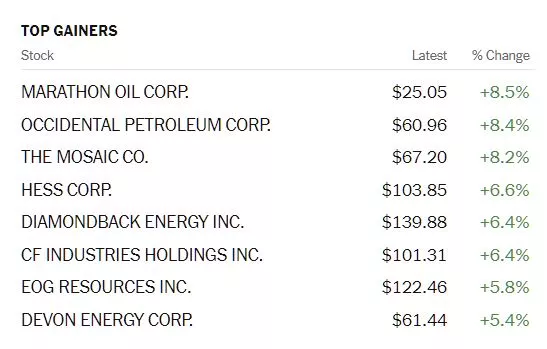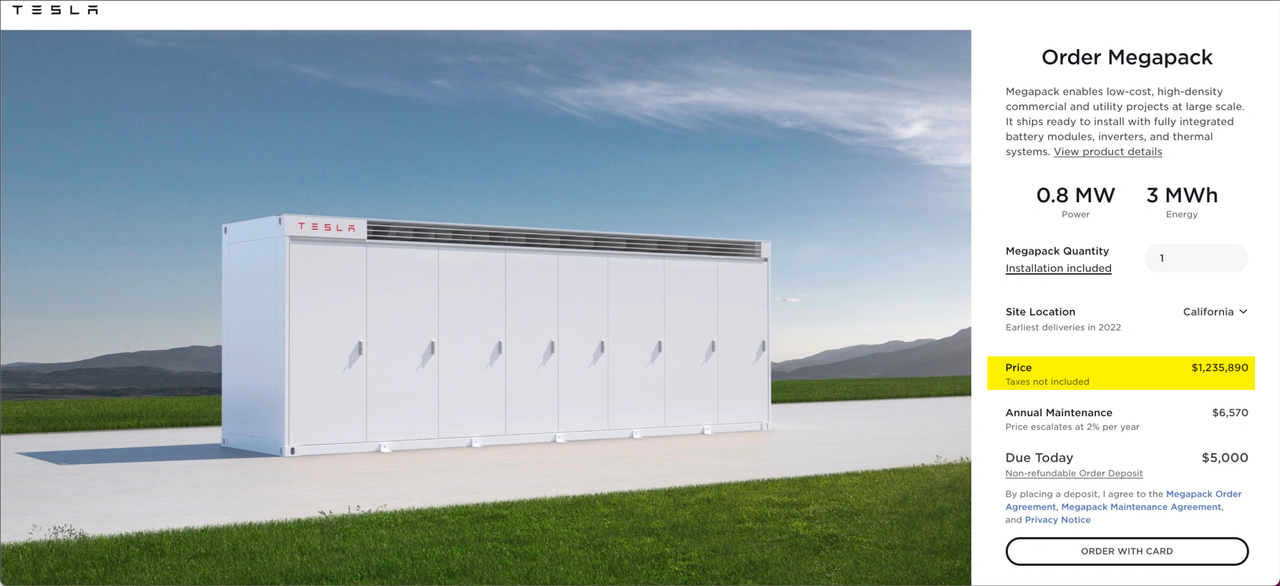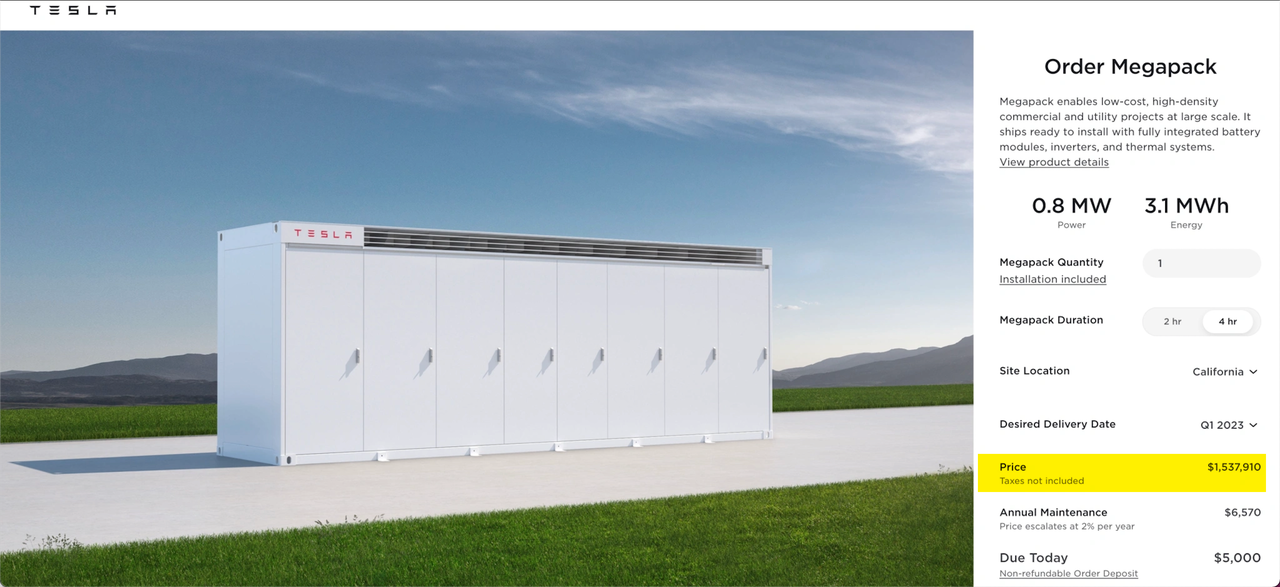Tuesday Talk: It's Powell Vs The Market And The Winner Is: Oil, For Now
After a day of bouncing down and then bouncing back up the S&P 500 closed almost exactly where it started; though the Dow dropped 202 points and the Nasdaq Composite was down 55 points. The S&P 500 closed at 4,461 down 2 points, the Dow closed at 34,553 and the Nasdaq Composite closed at 13,838. In early morning trading market futures are in the green. S&P 500 futures are trading up 13 points, Dow futures are trading up 157 points and Nasdaq 100 futures are trading up 28 points.
Monday's top gainers were largely Energy (Oil) sector related.

Chart: The New York Times
This morning several TalkMarkets contributors continue to weigh-in on the market implications of Russia's war on Ukraine and others focus on how to find which balls are staying up in the air in the midst of both Russian military barrages in Ukraine and Fedspeak and rate hike barrages in the market.
Contributor David Pinsen explains Why The Wheat ETF Spiked On Monday.

Tymur Khakimov/Pexels
Shares of the Teucrium Wheat Fund (WEAT) spiked 6.41% on Monday, and it was again the top name in our system on Monday night. The reason for the spike may have been an article over the weekend by the New York Times's Brazil bureau chief, Jack Nicas, arguing that the war in Ukraine might cause a global food crisis. Nicas summarized the key points of his article in the Twitter thread below.
Russia and Ukraine account for 30% of the world’s wheat exports, 17% of corn, 32% of barley & 75% of sunflower seed oil. Russia also exports about 15% of the world's fertilizer.
— Jack Nicas (@jacknicas) March 20, 2022
Now all of that food and fertilizer are stuck.
My story on a looming crisis:https://t.co/mIuWPkqDD9
And all of them will be bidding on an even smaller supply because China is buying much more than usual.
— Jack Nicas (@jacknicas) March 20, 2022
China just revealed that flooding delayed a third of its wheat crop, and now the upcoming harvest "can be said to be the worst in history,” said China’s agriculture minister.
But it's not just food. Russia is the world’s largest fertilizer exporter, and it has told its producers to halt exports.
— Jack Nicas (@jacknicas) March 20, 2022
Another major fertilizer exporter? Russia’s closest ally, Belarus. Just before the war, Belarus’s fertilizer exports were also blocked because of sanctions.
In Case The Wheat Fund Pulls Back
Ideally, negotiations between Russia and Ukraine lead to peace soon. If so, it's possible that the dynamic driving wheat prices higher could reverse, causing shares of WEAT to drop."
See the rest of Pinsen's article for how to trade wheat under currently volatile conditions.
TM contributor Tyler Durden notes that raw materials for Tesla (TSLA) batteries are also rising as a result of Russia's Ukranian incursion in Tesla Megapack Gets Massive Price Hike Amid Soaring Inflation.
"Tesla has hiked the price for its large-scale rechargeable lithium-ion battery product, otherwise known as the "Tesla Megapack," following a massive jump in industrial metal prices due to the Russian invasion of Ukraine. "
Megapack's 2021 pricing

Megapack 2022 pricing

"Tesla has yet to release a statement or comment or Elon Musk tweet about why the utility-scale battery pack has jumped in price. However, one can only assume it has to do with cost pressures from commodity inflation.
In the first half of March, Tesla raised the cost of its Model 3 car and other vehicles twice due to rising costs for batteries."
Contributor and economist Charles Hugh Smith chimes in, in an Op-Ed entitled Autocracy's Fatal Weakness .
Below is some of what he has to say:
"The various flavors of autocracy (theocracy, kleptocracy, dictatorship, etc.) look remarkably successful at first blush but they all share a fatal flaw. To understand the flaw we must start with the dominant dynamic of all organisms, natural selection. Things change. Those organisms which adapt quickly and successfully survive, those that don't perish."
"Autocracies view change they don't directly control as a threat to their power, which is absolutely correct: any change outside the autocrat's control can end up toppling the autocracy as waves of change ripple outward and interact with various systems. One domino falls and topples many others, and soon the entire system is no longer within the control of the autocrats."
Smith continues to advance his argument as the essay continues, but the market affecting point he makes is the following, "Eventually, a meteor strikes, and the least adaptive organisms and regimes expire...If we're entering an era of massive, non-linear disruption, those who have crippled their evolutionary churn as a threat will be the first to collapse--no matter how mighty they appear in the moment."
TalkMarkets contributor Mike Swanson writes that The Underlying Trends Of The Financial Markets Have Not Changed.

Swanson sums up market conditions as follows:
"Bulls had trouble yesterday getting the stock market to go up much more. Part of the reason is that CNBC reported on comments made by Jerome Powell that he takes inflation seriously and that the Federal Reserve will keep raising until inflation goes away. Some saw that as hawkish, but last week Powell claimed that all he needs to do is get the Fed Funds Rate into the 2.50% – 3% range next year and it will just vanish on its own.
It doesn’t really matter when it comes to bonds, because they are in a secular bear market now.
And commodities are in a secular bull market.
Even if the bulls can get the stock market to rally more here those two underlying trends are not going to change."
See the article for charts of stocks and commodities that Swanson indicates are keeping his portfolio up in the air at the moment.
Berkshire Hathaway preferred stock traded at a record high of $520,654.46 per share on March 18 (BRK-A). Both TM contributors Chris Vermeulen and Jim Van Meerten take a look at Berkshire Hathaway as an investment. Berkshire Hathaway common (BRK-B) closed at $349.66 per share on Monday.
In Warren Buffett’s Berkshire Hathaway Stock Tops $500,000 Vermeulen writes, "Very few can compete with his (Warren Buffet's) long-term track record. Since 1965, Berkshire has provided +20% average annual returns, almost double the +10.2% average annual returns for the S&P 500 Stock Index benchmark. The 2022 year-to-date comparison is:
Berkshire Hathaway Preferred A +14.53%; SPY SPDR ETF -6.36%; FB Facebook -35.64%
However, according to Buffett’s own humility, he has endured years of underperformance and has had his share of bad stock picks. When Buffet was asked about drawdowns at one of Berkshire’s annual meetings, he stated, “Unless you can watch your stock holdings decline by 50% without becoming panic-stricken, you should not be in the stock market.” According to Yahoo Finance, the five biggest percentage losses for Berkshire have been: 1974 -48.7%, 1990 -23.1%, 1999 -19.9%, 2008 -31.8%, and 2015 -12.5%."

Image: Berkshire Hathway
Van Meerten goes through the technical analysis and looks at what the Wall Street analysts have to say about Berkshire Hathaway stock.
"There seems to be a big disconnect between the professional investors who think the holdings are so diverse that they will mirror the market and the individual investors who worship Warren Buffet as the Greatest Investor Ever! I would never bet against Warren Buffet and Charlie Munger, but I think the pros do not have confidence in their successors."
See both articles for deeper analysis and commentary.
Contributor Felix Martinez who looks for dividend stocks takes a look at High Dividend 50: Antero Midstream Corp. an integrated producer of natural gas. The article is a full work-up of the company so it is a good first primer on the company.
"Antero Midstream Corp. (AM) is a high-yield overlooked midstream company. The stock currently yields an impressive 9.2% dividend yield. With the most recent dividend cut and the increased Free Cash Flow for the foreseeable future, the stock looks to be acceptable for an income-driven investor."
"However, the main challenge to the investment thesis is assuring investors that dependable cash flows cover its equity and debt securities and that it will be able to keep leverage ratios down even if its cash flows decline somewhat. As a result, despite the attractive yield...it does come with risks."
Caveat Emptor, as always.
That's a wrap for this Tuesday.
Have a good one, I'll see you on Thursday.




